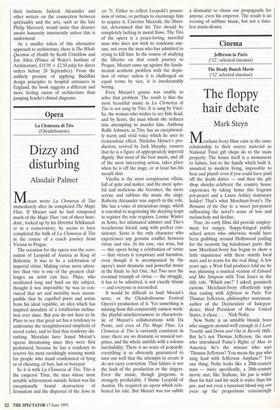Opera
La Clemenza di Tito (Glyndebourne)
Dizzy and disturbing
Alasdair Palmer
Mozart wrote La Clemenza di Tito immediately after he completed The Magic Flute. If Mozart said he had composed much of the Magic Flute 'out of sheer bore- dom', locked up by his librettist Schikaned- er in a conservatory, he seems to have completed the bulk of La Clemenza di Tito in the course of a coach journey from Vienna to Prague.
The occasion for the opera was the coro- nation of Leopold of Austria as King of Bohemia. It was to be a celebration of imperial virtue. Making virtue more attrac- tive than vice is one of the greatest chal- lenges an artist can face. Plato, who meditated long and hard on the subject, thought it was impossible: he was so con- vinced that art and morality were incom- patible that he expelled poets and artists from his ideal republic, an idea which has inspired moralists of a totalitarian inclina- tion ever since. But you do not have to be Plato to see that great art has a tendency to undermine the straightforward simplicity of moral codes, and to find that tendency dis- turbing. Moralists have found Mozart's operas threatening since they were first performed, because he has a tendency to reserve his most ravishingly winning music for people who stand condemned of lying or of cheating, of fury, lust or betrayal.
So it is with La Clemenza di Tito. Tito is the emperor Titus, the man whose most notable achievement outside fiction was his exceptionally brutal destruction of Jerusalem and the dispersal of the Jews in AD 71. Either to reflect Leopold's posses- sion of virtue, or perhaps to encourage him to acquire it, Caterino Mazzola, the libret- tist, determined that his Tito should be completely lacking in moral flaws. The Tito of the opera is a peace-loving, merciful man who does not wish to condemn any- one, not even the man who has admitted to trying to kill him. In the course of studying the libretto on that coach journey to Prague, Mozart came up against the funda- mental aesthetic problem with the depic- tion of virtue: unless it is challenged on equal terms by vice, it is irredeemably boring.
Even Mozart's genius was unable to solve that problem. The result is that the most beautiful music in La Clemenza di Tito is not sung by Tito. It is sung by Vitel- lia, the woman who wishes to see him dead, and by Sesto, the man whom she seduces into attempting to murder him. Anthony Rolfe Johnson, as Tito, has an exceptional- ly warm and vivid voice which he uses to tremendous effect. Nicholas Hytner's pro- duction, revived by Jack Murphy, ensures that he is a figure of appropriately imperial dignity. But most of the best music, and all of the most interesting action, takes place when he is off the stage, or at least has his mouth shut.
Vitellia is the most conspicuous villain, full of spite and malice, and the more spite- ful and malicious she becomes, the more serene and sublime the music she sings. Roberta Alexander was superb in the role. She has a voice of miraculous range, which is essential to negotiating the dizzying leaps in register the role requires. Louise Winter as Sesto, her infatuated admirer and Tito's treacherous friend, sang with perfect con- sistency. Sesto is the only character who experiences any genuine conflict between virtue and vice. In his case, vice wins, but — this opera being a celebration of virtue — that victory is temporary and harmless, even though it is accompanied by the opera's most dramatic and powerful music in the finale to Act One. Act Two sees the eventual triumph of virtue — the struggle, it has to be admitted, is not exactly titanic — and everyone is reconciled.
It would be difficult to fault Mozart's score, or the Glyndenbourne Festival Opera's production of it. Yet something is missing from this consistently earnest work: the playful mischievousness so characteris- tic of Mozart's collaborations with Da Ponte, and even of The Magic Flute. La Clemenza di Tito is curiously consistent in tone: there are no dramatic or musical sur- prises, and the whole unfolds with a solemn inevitability. There is no sense of jeopardy: everything is so obviously guaranteed to turn out well that the attempts to create it do not carry conviction. That failure is not the fault of the production or the singers. Even the music, though gorgeous, is strangely predictable. I blame Leopold of Austria. He required an opera which cele- brated his rule. But Mozart was too subtle a dramatist to churn out propaganda for anyone, even his emperor. The result is an evening of sublime music, but not a time- less music-drama.


































































 Previous page
Previous page